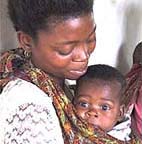|
||||

![]()
|
|
|
|
31 March 2000 Topics:
Summary of Discussion Global Fund for Children’s Vaccines: sub-account for strengthening of immunization services. The basic concept is, at the outset, to invest in a government’s commitment to strengthen immunization services, and thereafter, to reward a government for the increase it has actually achieved over the past year. Support would be disbursed in the form of ‘shares’, initially valued at US$20, with one share representing one un-immunized child. There would be no prescribed conditions on the use of the shares disbursed; the only condition is that immunization rates rise. For example, if a country were to set a goal of increasing immunization coverage by 10,000 children over baseline, and the local ICC and GAVI accepted this as a reasonable goal, the country would receive US$ 200,000 as an investment. Then, after the first year, if the country meets the goal by reaching 10,000 more children, the government will be compensated with another 10,000 shares, or US$ 200,000. It is a quite revolutionary concept – a performance-based system that relies on local Inter-agency Collaborating Committees (ICC) to set goals and monitor progress, but does not prescribe input monitoring systems. DTP3 coverage would be used to measure immunization rates; while an imperfect measure, it is widely recognized as the best tool that is available at this time. Improvements in indicators is envisioned as implementation proceeds. Due to their large populations and their relative strength in local vaccine production, individual negotiations will be held with China, India and Indonesia to discuss the most appropriate support for these countries from the Vaccine Fund. In fact, a mission to India is now being planned for the end of April, and one to Indonesia for the second half of May. The Board gave its general endorsement of the proposal outlined above for the use of the Vaccine Fund to support the strengthening of immunization services. Because this is such a revolutionary idea, in order to consult with regional and country-level partners and the countries themselves, the Board endorsed the proposal that the timeline for the distribution of proposals to countries and the disbursements of funds be pushed back. It was stressed that seeking and obtaining buy-in from countries will be especially important, as they are the most important partners in this effort. Therefore, the country proposal package will be sent to countries on 15 May with a deadline of 1 July for receipt of proposals at the GAVI Secretariat. The proposals will be reviewed by an expert panel in early July, with their recommendations provided to the Working Group and the Board by mid-July. The first round of disbursements from the Vaccine Fund would be made immediately thereafter. Revised timeline attached. Chris Lovelace proposed that the June Board meeting include a substantive discussion of financing. The Board welcomed the Bank to take a lead on this topic and "challenge" the GAVI partners. In preparation for a substantive discussion at the next Board meeting, Mr Lovelace was requested to develop a strategy for sustainable financing. The composition of the GAVI Board The Board welcomed the proposal to include Bill Gates Sr. as a representative of the Gates Foundation on the Board. He would be an observer at the June meeting and assume the official member role at the November meeting. There have been indications from a number of bilaterals that they would like to see the bilateral representation on the GAVI board increased. Several members expressed concern that the Board should not grow every time another partner wants to join; several felt that if bilateral representation were increased, developing country representation should also increase. Countries may represent national governments rather than distinct ministries. Jean-Jacques Bertrand conveyed the view that industry did not see the need to increase its representation on the GAVI Board. Representation of NGO’s would be welcome. The Board decided to discuss the topic further at the June meeting to reach a final decision on the Board size and composition. This discussion would take place in a broader context of GAVI governance. GAVI and the World Health Assembly Dr Brundtland indicated that she would refer to GAVI and the distribution of country proposals in her introductory speech, and that a technical briefing on GAVI would take place during the WHA. Dr Bergevin indicated that the government of Canada would host a working dinner for bilaterals to discuss GAVI on 16 May. Dr Lovelace had requested this topic to discuss a draft application from the Global Health Institute’s director, Richard Feachem, to the Gates Foundation. Dr Feachem had, in agreement with the Gates Foundation, chosen to circulate the application widely for comment. One component of this application for possible consideration is the monitoring of global resource flows related to immunization. This is a GAVI Secretariat responsibility, which it intends to commission out. The board urged multiple institutions to be considered, and agreed to submit proposals in this context.
Return to GAVI Board Documents
|
|
|
Contact GAVI | Guestbook | Text version | Credits and Copyright
|
|
